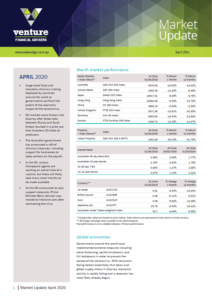The Pulse
- Large‐scale fiscal and monetary stimulus is being deployed by countries around the world as governments confront the extent of the economic impact of the coronavirus.

- Oil markets were thrown into disarray after failed talks between Russia and Saudi Arabia resulted in a price war that threatens US shale oil producers.
- The Australian government has announced a raft of stimulus measures, including support for businesses to keep workers on the payroll.
- In the US, various therapeutic agents are working on active trials of a vaccine, but these will likely take many more months to be made available.
- As the UK announced its own support measures, Prime Minister Boris Johnson was moved to intensive care after contracting the virus.
Global economies
Governments around the world have implemented extreme measures including social distancing, partial shutdowns, and full lockdowns in order to prevent the spread of the coronavirus.
US
The US appears set to pass a US $2 trillion fiscal stimulus package in response to the coronavirus. This amounts to around 10% of GDP, while the current fiscal deficit is around 5%.
Europe
EU leaders continue to disagree on a fiscal response to the coronavirus. While there were signs of some early support for socalled ‘corona‐bonds’, which would take the form of jointly‐issued debt by EU member states, the idea was ultimately rejected by Germany and the Netherlands.
China
The situation in China appears to be stabilising, with the rate of infection slowing in recent weeks while the rest of the world takes action to prevent the spread.
Asia region
Japan is preparing to deploy a large‐scale stimulus package worth JPY 108 trillion (US $990 billion) – the equivalent of 20% of GDP – to combat the economic impact of the coronavirus.
Australia
As the COVID‐19 pandemic sweeps across the globe, shutting down countries and closing borders, the Australian Government had to quickly come to terms with the severity of the health crisis and the inevitability of an economic recession.